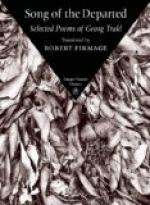|
This section contains 6,861 words (approx. 23 pages at 300 words per page) |

|
SOURCE: "Georg Trakl's Dark Mirrors," in Modern Austrian Literature, Vol. 25, No. 2, 1992, pp. 15-35.
The following essay explores modes common to much of Trakl's verse: its reflexivity, revisionism, and its many "mirror motifs."
In meiner Seele dunklem Spiegel
Sind Bilder niegeseh'ner Meere,
Verlass'ner, tragisch phantastischer Länder
Zerfliessend ins Blaue, Ungefähre.
Georg Trakl
I
"I imagine," wrote Rainer Maria Rilke after reading George Trakl's first volume of poetry, published posthumously in 1915, "that even the initiated experiences these views and insights as an outsider pressed against panes of glass: for Trakl's experience occurs like mirror images and fills its entire space, which, like the space in the mirror, cannot be entered." Though Rilke's metaphor of the mirror is frequently cited as a poignant image for evoking that "alienated realm of [Trakl's] poetic experience which is fundamentally inaccessible" there is a second—and invariably overlooked—aspect of Trakl's work which...
|
This section contains 6,861 words (approx. 23 pages at 300 words per page) |

|


